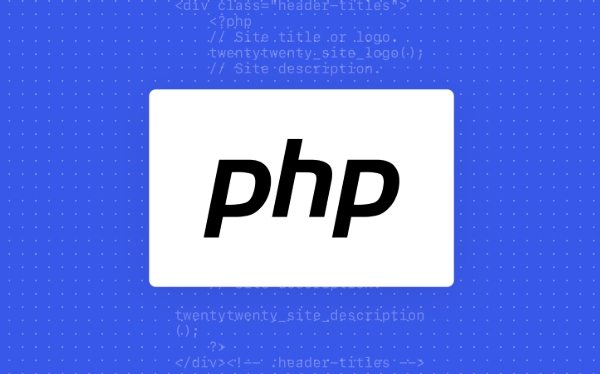 Backend Development
Backend Development
 PHP Tutorial
PHP Tutorial
 Demystifying Global Access: `global` Keyword vs. the `$GLOBALS` Array
Demystifying Global Access: `global` Keyword vs. the `$GLOBALS` Array
Demystifying Global Access: `global` Keyword vs. the `$GLOBALS` Array
Jul 25, 2025 am 05:27 AMThe two main tools for accessing global variables in PHP are the global keyword and the $GLOBALS superglobal array; 1) The global keyword creates a reference to a global variable inside a function, allowing direct access and modification, and if the variable is undefined, it initializes it as null; 2) The $GLOBALS array provides direct access to all global variables via array syntax, does not require declaration, and accessing an undefined key triggers a notice; 3) global is preferred for simplicity and readability when working with known variables, while $GLOBALS is better for dynamic or conditional access; 4) Both introduce side effects by enabling global state modification, so they should be used sparingly to maintain code testability and avoid bugs; 5) Performance-wise, global has a slight edge due to direct referencing, whereas $GLOBALS involves array lookup overhead—choosing between them depends on context, clarity, and need for dynamic access.

When working with PHP, managing variable scope—especially access to global variables from within functions—can be a common source of confusion. Two tools stand out for this purpose: the global keyword and the $GLOBALS superglobal array. While they both allow access to global variables inside functions, they work differently under the hood and have distinct use cases. Let’s break down the differences and clear up the confusion.

What the global Keyword Does
The global keyword tells PHP that you want to use a variable from the global scope inside a function. It essentially creates a reference to the global variable, making it available locally.
$color = 'blue';
function showColor() {
global $color;
echo $color;
}
showColor(); // Outputs: blueHere, global $color; links the local $color inside the function to the globally defined $color. Any changes made to $color inside the function will affect the global variable.

You can also declare multiple globals at once:
global $var1, $var2, $var3;
Key Point: global creates a reference. It doesn’t copy the value—it links to the original variable.

How $GLOBALS Works
$GLOBALS is a superglobal array that holds all global variables as key-value pairs, where the key is the variable name (as a string) and the value is the current value of that variable.
$color = 'blue';
function showColor() {
echo $GLOBALS['color'];
}
showColor(); // Outputs: blueUnlike global, $GLOBALS is always available and doesn’t require a declaration. You access global variables using array syntax.
You can also modify global variables directly:
function changeColor() {
$GLOBALS['color'] = 'red';
}After calling changeColor(), the global $color becomes 'red'.
Key Differences Between global and $GLOBALS
| Feature | global Keyword | $GLOBALS Array |
|---|---|---|
| Syntax | global $var; | $GLOBALS['var']; |
| Type | Language construct | Superglobal array |
| Scope Access | Brings global variable into local scope | Direct access via array index |
| Modification | Modifying the local reference changes the global | Assigning to $GLOBALS['var'] updates global |
| Variable Existence | Using global on an undefined var creates it as null | $GLOBALS['undefined'] triggers a notice |
| Performance | Slight edge in speed (direct reference) | Array lookup (tiny overhead) |
Practical Considerations
Use
globalfor simplicity and readability when you need to work with a few global variables in a function. It's cleaner and more straightforward.Use
$GLOBALSwhen you need dynamic access, such as looping through global variables or conditionally accessing them by name.foreach (['color', 'size', 'shape'] as $var) { if (isset($GLOBALS[$var])) { echo $GLOBALS[$var]; } }Avoid overusing either—heavy reliance on global state makes code harder to test and maintain. Consider dependency injection or configuration objects instead.
Be cautious with side effects: Both methods let you modify global state, which can lead to bugs if not carefully managed.
A Subtle Gotcha
There’s a subtle behavior when using global with uninitialized variables:
function test() {
global $undefined;
var_dump($undefined); // NULL, even if not previously defined
}PHP initializes $undefined as null in the global scope when you declare it with global. This doesn’t happen with $GLOBALS['undefined'], which will trigger a notice if accessed without prior definition.
In short:global is like saying, “I want to work with this global variable directly.”$GLOBALS is like saying, “Give me a map of all global variables—I’ll look up the one I need.”
Both get the job done, but choosing the right one depends on clarity, context, and whether you need dynamic access.
Basically, know your tools—and use them wisely.
The above is the detailed content of Demystifying Global Access: `global` Keyword vs. the `$GLOBALS` Array. For more information, please follow other related articles on the PHP Chinese website!

Hot AI Tools

Undress AI Tool
Undress images for free

Undresser.AI Undress
AI-powered app for creating realistic nude photos

AI Clothes Remover
Online AI tool for removing clothes from photos.

Clothoff.io
AI clothes remover

Video Face Swap
Swap faces in any video effortlessly with our completely free AI face swap tool!

Hot Article

Hot Tools

Notepad++7.3.1
Easy-to-use and free code editor

SublimeText3 Chinese version
Chinese version, very easy to use

Zend Studio 13.0.1
Powerful PHP integrated development environment

Dreamweaver CS6
Visual web development tools

SublimeText3 Mac version
God-level code editing software (SublimeText3)

Hot Topics
 The Omnipresent Scope: A Practical Guide to PHP's Superglobals
Jul 26, 2025 am 09:47 AM
The Omnipresent Scope: A Practical Guide to PHP's Superglobals
Jul 26, 2025 am 09:47 AM
PHP's hyperglobal variables are always available built-in arrays used to process request data, manage state and obtain server information; 1. When using $_GET, URL parameters need to be type-converted and verified; 2. When receiving form data through $_POST, filtering should be performed with filter_input(); 3. Avoid using $_REQUEST to prevent security vulnerabilities; 4. $_SESSION needs to call session_start() and log in to reset the session ID; 5. When setting $_COOKIE, enable secure, httponly and samesite attributes; 6. The information in $_SERVER cannot be fully trusted and cannot be used for security verification; 7.$_ENV may be
 Navigating the Boundaries: A Deep Dive into Local and Global Scope
Jul 26, 2025 am 09:38 AM
Navigating the Boundaries: A Deep Dive into Local and Global Scope
Jul 26, 2025 am 09:38 AM
Thedifferencebetweenlocalandglobalscopeliesinwherevariablesaredeclaredandaccessible:globalvariablesaredefinedoutsidefunctionsandaccessibleeverywhere,whilelocalvariablesaredeclaredinsidefunctionsandonlyaccessiblewithinthem.1.Globalscopeallowsbroadacce
 Demystifying Global Access: `global` Keyword vs. the `$GLOBALS` Array
Jul 25, 2025 am 05:27 AM
Demystifying Global Access: `global` Keyword vs. the `$GLOBALS` Array
Jul 25, 2025 am 05:27 AM
ThetwomaintoolsforaccessingglobalvariablesinPHParetheglobalkeywordandthe$GLOBALSsuperglobalarray;1)Theglobalkeywordcreatesareferencetoaglobalvariableinsideafunction,allowingdirectaccessandmodification,andifthevariableisundefined,itinitializesitasnull
 Mastering Lexical Scoping: The `use` Keyword and PHP Anonymous Functions
Jul 25, 2025 am 11:05 AM
Mastering Lexical Scoping: The `use` Keyword and PHP Anonymous Functions
Jul 25, 2025 am 11:05 AM
In PHP, if you want to use external variables in anonymous functions, you must explicitly import them through the use keyword; 1. Use is used to introduce external variables into the lexical scope of the closure; 2. Pass variables by default by value, and pass them by reference with &$var syntax; 3. Multiple variables can be imported, separated by commas; 4. The value of the variable is captured when the closure is defined, not when it is executed; 5. Each iteration in the loop creates an independent closure copy to ensure that the variable value is correctly captured; therefore, use is a key mechanism to achieve the interaction between the closure and the external environment, making the code more flexible and controllable.
 The Scope Resolution Order: How PHP Finds Your Variables
Jul 25, 2025 pm 12:14 PM
The Scope Resolution Order: How PHP Finds Your Variables
Jul 25, 2025 pm 12:14 PM
PHPresolvesvariablesinaspecificorder:1.Localscopewithinthecurrentfunction,2.Functionparameters,3.Variablesimportedviauseinclosures,4.Globalscopeonlyifexplicitlydeclaredwithglobaloraccessedthrough$GLOBALS,5.Superglobalslike$_SESSIONand$_POSTwhichareal
 Why Your Variables Disappear: A Practical Guide to Scope Puzzles
Jul 24, 2025 pm 07:37 PM
Why Your Variables Disappear: A Practical Guide to Scope Puzzles
Jul 24, 2025 pm 07:37 PM
Variablesdisappearduetoscoperules—wherethey’redeclareddetermineswheretheycanbeaccessed;2.Accidentalglobalcreationoccurswhenomittingvar/let/const,whilestrictmodepreventsthisbythrowingerrors;3.Blockscopeconfusionarisesbecausevarisfunction-scoped,unlike
 Scope Implications of Generators and the `yield` Keyword
Jul 25, 2025 am 04:45 AM
Scope Implications of Generators and the `yield` Keyword
Jul 25, 2025 am 04:45 AM
Functions using yield will become generators, and when called, they return the generator object instead of being executed immediately; 2. Local variables of the generator will not be destroyed during the yield pause, but will continue to exist with the generator frame until the generator is exhausted or closed; 3. Extended variable life cycle may lead to an increase in memory usage, especially when referring to large objects; 4. When combined with closures, LEGB rules are still followed, but the latebinding problem of looping variables needs to be solved by immediately binding (such as the default parameter value); 5. .close() should be called explicitly to ensure that finally block execution is performed to avoid delays in resource cleaning. The generator affects memory and behavior by extending the survival time of variables, but does not change the lexical scope rules.
 The `global` Keyword: A Double-Edged Sword in PHP Scope Management
Jul 25, 2025 pm 05:37 PM
The `global` Keyword: A Double-Edged Sword in PHP Scope Management
Jul 25, 2025 pm 05:37 PM
TheglobalkeywordinPHPallowsfunctionstoaccessvariablesfromtheglobalscope,butitshouldbeusedsparinglyduetosignificantdrawbacks.1)Itenablesquickaccesstoconfigurationvaluesinsmallorlegacyscripts.2)ItfitsproceduralcodebaseslikeolderWordPresspluginswheredep





